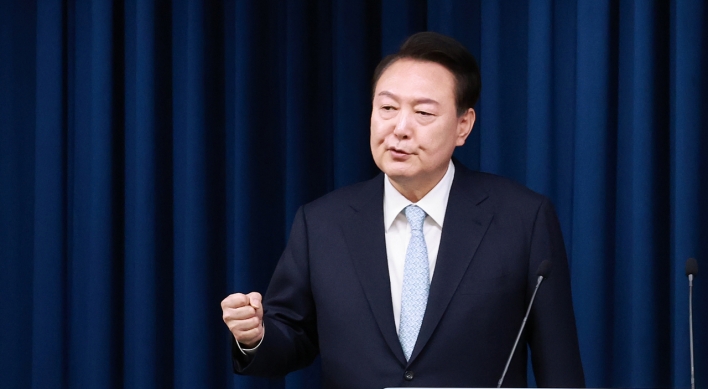[Editorial] Shift in COVID-19 policy
Health authorities must step up policies to fight possible outbreaks of new viruses
By Korea HeraldPublished : May 10, 2023 - 05:31
The World Health Organization announced Friday that COVID-19 is no longer a global public health emergency, a landmark declaration that calls for a change in policy and strategy to handle the coronavirus.
The WHO said in a statement that deaths and hospitalizations related to COVID-19 are declining, while the levels of immunity to the coronavirus is going up as a result of vaccination or prior infection. The global health agency suggests it is time to shift to more long-term prevention and control of the disease.
There is no question that the WHO’s announcement is a positive signal for both policymakers and people, who have been struggling to fight COVID-19 since early 2020.
The WHO declared COVID-19 a public health emergency of international concern on Jan. 30, 2020. It announced the coronavirus outbreak is a pandemic on March 11 of the same year. And the pandemic wreaked havoc on a global scale: more than 750 million confirmed cases and nearly 7 million people who died from the disease.
The coronavirus also reshaped the way people work, study and communicate. Remote work and online learning were widely adopted as part of social restrictions to reduce infection risks. In the process, companies and schools confronted a slew of side effects such as low levels of efficiency, while businesses taking advantage of contactless trends expanded at a rapid clip.
The dispute flared up over the government’s tight control on the lives of people through stringent social restrictions. Central banks across the globe rushed to slash interest rates to soften the negative impact of weak demand linked to COVID-19, resulting in high inflation. Economic policymakers came up with various measures to combat a sharp economic downturn along with the supply chain disruptions that left many companies bankrupt and reconfigured the old dynamics of major industries.
But is it safe to say that the pandemic is finally over? Given the latest data, South Korea is not completely out of the COVID-19 danger zone yet. Rather, it remains exposed to the risks of a resurgence in infections.
For instance, the country’s new coronavirus cases shot up to surpass 20,000 on Tuesday, marking a three-month high due largely to eased social restrictions. The Korea Disease Control and Prevention Agency said the number of confirmed cases reached 21,681, increasing the total caseload to 31,307,591. Fourteen more people died from COVID-19, bringing the death toll to 34,548.
In March, the nation lifted the mask mandate for public transportation, while keeping the restriction only for medical facilities, pharmacies and facilities vulnerable to infections.
More policy steps to ease the regulations are set to be implemented, such as shortening the mandatory virus isolation period -- a shift in tandem with the WHO’s official announcement on the end of the pandemic.
The government’s overall policy toward the weakening coronavirus is set in the right direction. While easing restrictions, the government is taking measures aimed at recovering the economy, which has been badly damaged by the prolonged pandemic. It is also expected to strengthen policies so that medical companies can better prepare against new outbreaks.
But the pace of loosening regulations must be carefully controlled, as there are still possibilities of outbreaks sparked by new strains with high infection rates.
The cost of lacking policy tools and medical infrastructure to fight new virus outbreaks is immense. In the past two decades, the nation suffered a variety of infectious diseases such as SARS, H1N1 and MERS -- not to mention the deadly coronavirus.
In some cases, Korea was lauded for its strong antivirus policies that brought encouraging results. However, the country has to depend on imported vaccines as it is lagging far behind advanced countries in the biomedical field.
The impact of the pandemic is likely to last longer than expected. The coronavirus is still infecting and killing people, while many people are still struggling with debilitating post-infection symptoms of the so-called “long COVID.”
Korean policymakers and health authorities need to take seriously the warning from WHO Director-General Tedros Adhanom Ghebreyesus, who said in a May 5 news conference: “This virus is here to stay.”
-
Articles by Korea Herald








![[KH Explains] Can tech firms' AI alliances take on Nvidia?](http://res.heraldm.com/phpwas/restmb_idxmake.php?idx=644&simg=/content/image/2024/05/07/20240507050619_0.jpg&u=)









![[K-pop’s dilemma] Time, profit pressures work against originality](http://res.heraldm.com/phpwas/restmb_idxmake.php?idx=652&simg=/content/image/2024/05/08/20240508050705_0.jpg&u=20240508171126)
![[Today’s K-pop] NCT Dream to drop pre-release from 2nd Japan single](http://res.heraldm.com/phpwas/restmb_idxmake.php?idx=642&simg=/content/image/2024/05/08/20240508050725_0.jpg&u=)